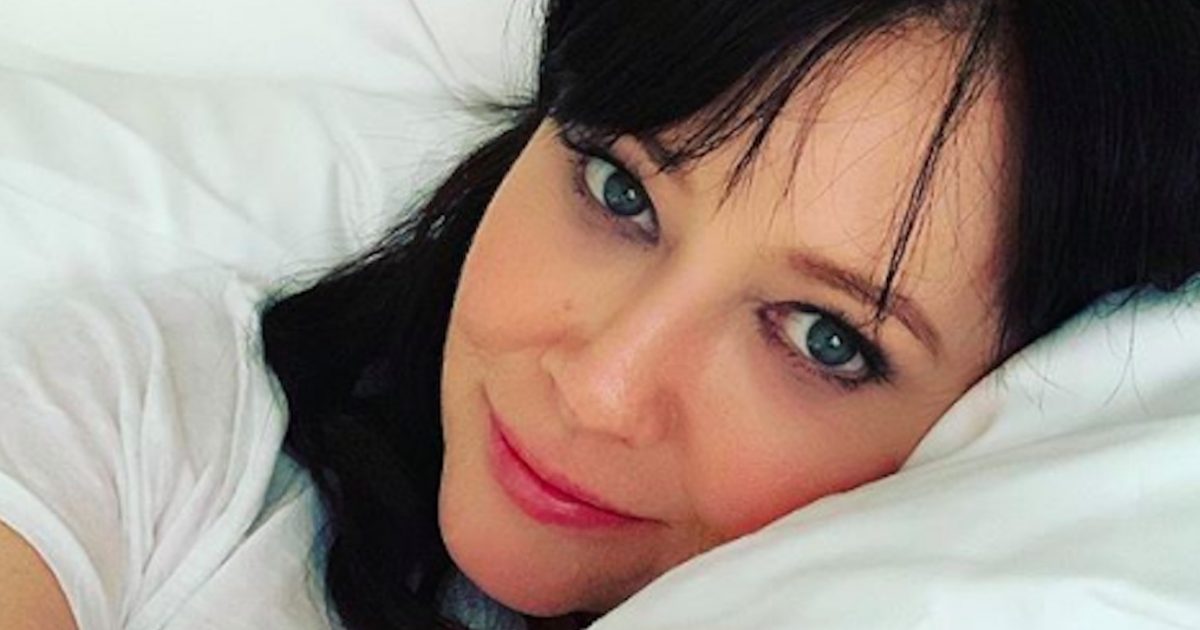One week after revealing her stage 4 breast cancer diagnosis, Shannen Doherty is feeling grateful. The “Beverly Hills: 90210” actor, who’s been soaking up love and well-wishes from friends and fans, paused on Tuesday to express her appreciation.
“I want to thank all of you for your love, prayers and support,” she wrote in a post on Instagram. “It’s an odd time right now and I find my feet are not completely underneath me.”
Read MoreShannen Doherty’s First Breast Cancer Diagnosis
Doherty was first diagnosed with breast cancer in 2015. Early efforts to treat her cancer without a mastectomy or aggressive treatments were not enough as doctors realized her cancer had spread to the lymph nodes. In the end, the actress underwent estrogen therapy treatments, a mastectomy, chemotherapy, radiation and surgery before declaring herself cancer free in 2018.
At the time, she acknowledged that the treatment had caused her to enter menopause, making pregnancy impossible without taking hormone pills. She decided against it due to fear that estrogen levels can increase the chance of cancer returning.
While considering other options to become a mother, she expressed her concerns over how long she had until relapsing. “We're having conversations about an egg donor, maybe adoption,” she told Health. “But there's fear there. Am I going to last five years? Ten years? I certainly wouldn't want my 10-year-old burying a mother.”
RELATED: Shannen Doherty's Sisterhood Rallies Around Her Following Stage 4 Breast Cancer Diagnosis
She received her new diagnosis — stage 4 — about a year ago, but Doherty opted to keep the news private as she worked on filming the “90210” reboot (since canceled) leaning on castmates, such as Brian Austin Green, she said.
Doherty went public with her stage 4 diagnosis in a Feb. 4 interview with ABC’s Amy Robach, herself a breast cancer survivor, “I definitely have days where I say, ‘Why me?’ And then I go, ‘Well, why not me? Who else? Who else besides me deserves this?'” Doherty said. “None of us do.”
Dealing with a Late-Stage Breast Cancer Diagnosis
Stage 4 breast cancer means that your cancer has metastasized and is no longer regionalized to the breast. While treatable, this cancer currently has no cure.
While we don’t know the specifics of Doherty’s breast cancer, the treatment for metastatic disease can vary significantly depending on features of an individual woman’s cancer.
Treatment options include hormone therapy, chemotherapy and targeted drugs. Sometimes surgery and/or radiation is considered. The goal is to keep you as stable as possible, slow the tumor growth and improve quality of life.
Hormone Therapies for Breast Cancer: CDK 4/6 Inhibitors
A new class of targeted therapy drugs called kinase inhibitors can now help treat some metastatic breast cancers, Dr. Erica Mayer of the Dana-Farber Cancer Institute, told SurvivorNet in a previous conversation. These drugs target two kinase proteins, called cyclin-dependent kinase 4 and 6, that normally regulate the cell cycle and division. There are three CDK 4/6 inhibitors available: palbociclib (Ibrance), ribociclib (Kisqali), and abemaciclib (Verzenio).
Dr. Erica Mayer explains hormone therapy options available for breast cancer patients
These drugs are primarily used in women with hormone receptor-positive and HER2-negative breast cancer. When they are combined with other hormone therapy, many women can have up to two years of their cancer not getting any worse. A common side effect was a decrease in white blood cells which can increase the risk of infection.
RELATED: An Overview of Treatment Options for Advanced Breast Cancer
What's Next for Breast Cancer and Immunotherapy?
Immunotherapy has been a game-changing treatment option when it comes to treating several cancers. But until recently, researchers hadn't had much success using the therapy to fight breast cancer. That's changing now.
Dr. Sylvia Adam talks about breast cancer and immunotherapy
"The question now becomes, is it only triple negative breast cancer that can benefit from immunotherapy, or are there other subtypes as well?" Dr. Sylvia Adams, a medical oncologist at NYU Perlmutter Cancer Center, said to SurvivorNet in a previous interview.
"If a tumor has the PD-L1 protein in it, that means there's already an inflammatory response, that the patient's immune system already recognized the tumor and was starting to work against it. The benefit of identifying such a strong biomarker in the triple negative subset will allow us to actually test for the presence and responsiveness to immunotherapy in other subtypes of breast cancer."
Learn more about SurvivorNet's rigorous medical review process.


